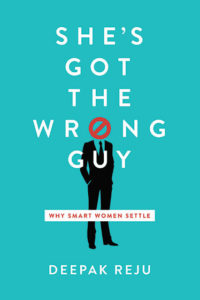Sometimes a pointed comment sticks with you for years. A decade back, a dad of two unmarried mid-twenties daughters exclaimed in exasperation, “I really don’t know what guys are looking for in a girl.” I knew those young women. They were beautiful, talented, educated, faithful Christians. The one in particular even had a delightful sense of humour. So what are guys looking for? And when they don’t make a move, what is the girls’ response? Sometimes it means that a woman – a smart woman – will “settle.” That is the premise of Deepak Reju’s book, She’s Got the Wrong Guy-Why Smart Women Settle.
Deepak Reju, a pastor of biblical counseling and families in a Baptist Church in Washington, DC, writes from a wealth of experience with the sad consequences that arise when women make poor choices in marriage. He writes with genuine empathy for the realities 21stcentury Christian women face. Some problems are ageless. When confronted with the spectre of the single life, women have always questioned themselves. What is wrong with me? Am I never going to have children? Doesn’t God care that I feel lonely?
Today there are added challenges. Sex is everywhere, more than ever. Both men and women are single longer and marry later, requiring a sustained commitment to purity. Technology has changed the way we do relationships. Face-to-face conversations, always more risky, become the exception. There is comfort in hiding behind a screen. “It’s a lazy man’s dream – no intentionality, no commitment, and no risk” (p. 5). Online dating allows optimal, but not necessarily honest, presentation of oneself.
Another reality is that today more women are educated, accomplished and talented as they enter the workforce. With university degree in hand they move into successful careers. This may be intimidating for some men. The secular world generally does a better job valuing women for their intelligence and capabilities. Christian women are affirmed and rewarded in the workplace, but often treated like second-class citizens in their church. Dating as a conservative Christian woman is hard; dating as an intelligent, gifted and self-confident Christian woman seems almost impossible (p. 6).
Added to this mix of challenges is the current confusion over sexuality, gender, the value of marriage, and the rising number of divorced singles and single parents. Reju suggests that faced with such a confusing, complex world of dating, women too often make the choice to simply settle for an OK man.
It could be that a woman thinks of marriage as the most important goal of life, a sort of idolatry. “As Christian women, we teach the gospel, pray the gospel, sing the gospel – and we secretly hope for marriage” (p. 7). One can hardly blame her, since that is typically an unspoken expectation in church communities.
Or “settling” could be the result of personal baggage that makes a woman undervalue herself. I don’t really deserve better. It’s the best I can do. She might have blinders on, refusing to see the problematic aspects of a dating relationship. He’s not very spiritually minded now, but I’m sure that’ll change after we’re married. She may live with anxiety, fearful that she is not really lovable, or seen as too picky, or that she’ll always have to fend for herself. Fear of loneliness is real. It’s good to reflect what it would be like attend several weddings each year as a single (Will I ever walk down the aisle?) and baby showers after that. And how about never having a reason to go to the church nursery except to babysit other women’s children? I remember the exasperation of one single woman in her early thirties who still visited with her married girlfriends: “If I hear another breast feeding or diaper rash story, I’m going to scream….or puke!”
Men to watch out for
Reju is not dismissive of the discouragement and loneliness single women feel, but he urges them not to forget Jesus. Instead, desire him above all else. As Christians, our goal, male or female, is to form our lives around growing closer to Jesus. Marriage and family life are valuable, but they are earthly treasures. Christ remains the greatest treasure.
That said, the bulk of the book deals with the ten, yes ten, categories of men to avoid in dating. It’s a formidable list. Avoid the following:
- the control freak
- the promiscuous guy
- the unchurched guy
- the new convert
- the unbeliever
- the angry man
- the lone ranger
- the commitment-phobic man
- the passive man
- and the unteachable guy
Each of these types will present significant issues in a marriage. It will be more difficult for the wife to mature as a Christian. It is unlikely the relationship will be truly loving or of mutual benefit. Likely the woman will suffer. Each chapter of about ten pages includes an engaging story of a couple that highlights the serious challenges that develop.
A brief look at one of the stories – that of Janelle and Dominique – will give a taste of Reju’s approach to the complex topics he’s addressing.
Janelle, from a Christian home, met Dominique, a relatively new believer, at church and began dating. It wasn’t long before she noticed his controlling patterns. When she was with girlfriends he would call to ask where she was. He would check with her multiple times a day. She rationalized his behavior, “He’s protective of me.” But his behavior was sometimes accompanied by anger, jealousy, and insistence on his own way. Despite realizing that her relationship had problems and that her guy didn’t meet the biblical criteria of a loving husband, she carried on. She thought, “He knows me; we are making it work; he’s fun; and I like him.” It seemed like too much work to untangle the relationship and start over. Besides, that would be admitting failure. And things would change once they were married.
But warning flags should be flying! Such a man displays a warped perspective on what the Bible says about male leadership. He uses Scripture to make his girlfriend or wife do what he wants. He lords it over her through spiritual language that is twisted to support his demands. Maybe such a man could change with growing maturity, but it’s better and much safer not to date this sort until he does. Don’t assume that you can change him. Better to break off and not marry him, than face a lifetime of emotional abuse, and worse.
Interestingly, Reju devotes a whole chapter to the topic of ending relationships: “Breaking up for the Glory of God.”
Who’s left?
As I made my way through chapter after chapter on men to avoid, I began to wonder, “Well, who’s left. Now what? Should women just stay single?” Thankfully, the author offers a way forward.
There are godly men who desire to serve the Lord within the context of marriage. Women must realize that there is no perfect man, even if he is a committed Christian. It happens that good men are overlooked because they don’t meet expectations in superficial or non-essential things, like physical appearance, age, or charisma. Furthermore, a woman cannot expect complete maturity and thoughtfulness from a man in his twenties or even thirties. Christian maturity takes time. So it is possible to choose wisely while choosing an imperfect man. Choose to be attracted to one who is growing in Christ and demonstrates interest in continued growth in Christ together with you. Don’t settle for the problematic man who is far from God and shows little sign of change.
Reju devotes a final segment explaining that waiting is OK. Yes, waiting is hard, but there is a way to wait well. I think it’s fair to say that in many churches singleness is not seen as a beautiful thing. Scripture presents a high view of marriage, with only a couple passages highlighting the benefit of being single. Reju suggests that singles may be made to feel incomplete. I would argue that at times we are even guilty of taking advantage of our singles, counting on them for some heavy lifting for our church programs and duties. One mature single confided to me, “They say, ‘Well, you’re alone anyway so you have more time.’” She continued, “They should realize that I have to do everything myself, including groceries, home repairs, painting and car maintenance. I have no one to share the workload. I work full time. I probably have less not more time.” So, church involvement, yes, but certainly to be accompanied with a lot of appreciation and support.
The author argues that what makes waiting hard is that it exposes the heart. You begin to believe that what you “want” is what you “need.” Waiting is hard because it shows what you really worship. Patience is difficult. What do you pray while you are waiting? And then there is the challenge of maintaining sexual integrity. Desire for sex is a healthy thing. Desire for children, no less so. These are challenging realities to face, while not knowing if the desire for marriage will ever be fulfilled.
But it is possible to wait well. Scripture does portray singleness as a positive thing that allows a single-minded devotion to the Lord. Remember, marriage is temporal, singleness lasts to eternity, for everyone. The goal is to wait on the Lord, not to wait for marriage. Be willing to share your heartache and pain with others. In the church we live in community; singles and marrieds need each other as we wait together. Remember that no man will ever fulfill your ultimate desires; only one bridegroom does that and he’s planning the ultimate wedding banquet.
Conclusion

192 pages / 2017
Would I recommend this book? Yes, certainly for single women who are dating. The book offers pertinent questions and issues to consider before making any commitment to marriage. Breaking up for the glory of God may be necessary. The book also offers helpful advice for single women not in a relationship. It will expose the heart’s desires, and help her not to settle for being married to an unsuitable man, but to wait, relying that God’s grace will be sufficient.
Single men should read the book as well. They will gain insight into the typical longings of a woman’s heart. If they find a chapter or two that serves as mirror for them, there is the choice to put away ungodly attitudes and become the mature man in Christ. It will also be a helpful read for friends of singles and those who counsel them. And while I agree the title is catchy, I wonder if it might put off exactly those who could benefit most from reading it.
I was also left with the thought there could be a second volume, warning men which women to avoid: the manipulator, the gossip, the passive-aggressive, the I’ll-change-you-for-the-better-agent and of course, the unbeliever, the unchurched and the angry woman. All in all, I appreciated the honesty of Reju’s book. He writes with empathy and understanding. His advice rings true.
Some final reflections: I read this book with keen awareness of the many beautiful, talented, educated, godly young women (and some men) in our church communities. I wonder what it’s like to be a single in our churches. That would be worthwhile to explore. Are they lonely even while being part of a congregation? Are they appreciated for who they are as singles, or perhaps somewhat pitied? How well do our churches serve and support our singles in their twenties and thirties, and beyond? Do our conversations revolve around our families, our spouses, and children with scant thought what that feels like to someone who longs for marriage and children? Do we encourage post-secondary education for our young women according to interest and ability, or do we fear that will make them less marriageable? Do we expect singles to shoulder tasks in the church because, “Well, they have the time, anyway?” Are we as inclusive as we purport to be? It’s a good thing when a book makes the reader reflect on the broader issues at play in our churches. She’s Got the Wrong Guy: Why Smart Women Settle is one of those books, and well worth the read!












